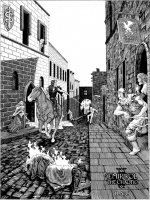Well, I figured it was a pipe dream, but I thought I'd ask. It really does make it difficult to talk about some topics though. I'm a big fan of how the modern world came to be, and the often strange turns of events that led to many advances throughout history. Now D&D isn't trying to modern any historical period (it being a rather eclectic mishmash of different eras, usually trying to dance around anything that "feels" hi-tech, despite having rapiers, bastard swords, and galleons but not having recurve bows or cannons), but trying to figure out how a campaign setting works is a topic that fascinates me, even if I'm sure my DM's wish it didn't.
I remember playing Kingmaker and being really impressed by the ramifications of Golarion having printing presses, for example, wondering if, with the right inks, one could mass produced spellbooks...
But anyways, a few posts seem to think my goal is to fit D&D into a nice box. It's not. If you want to create an uber gritty or utterly fantastic world, you can, of course, and that's a good thing! But the model of "you see, a typical D&D world is like Europe in the 1200's except for magic and monsters!
But yes to full plate armor and halberds and no to hand cannons and the Bessemer process, thank you very much.
And my first question is, yeah but how? I mean not how magic or monsters work, but how the world chugs along as if these things didn't exist (except when it doesn't).
Anyways, about the Super Guards- I don't think I've ever specifically seen 7th level PC's challenged by town guards, but I have seen DM's smack down players with surprisingly competent NPC's when they decide "Great Gygax! We're powerful, let's take this town apart like Emirikol the Chaotic!", even if they had previously said that there likely isn't anyone with more than 3 or 4 Hit Dice in the whole area besides the PC's...




